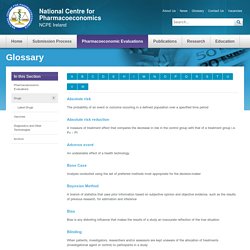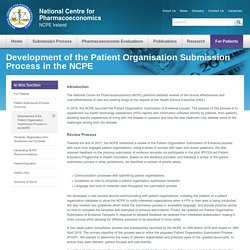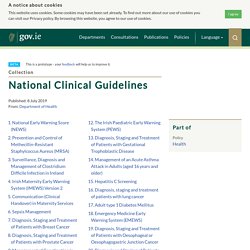

National Centre for Pharmacoeconomics. The probability of an event or outcome occurring in a defined population over a specified time period A measure of treatment effect that compares the decrease in risk in the control group with that of a treatment group i.e.

Pc – Pt An undesirable effect of a health technology Analysis conducted using the set of preferred methods most appropriate for the decision-maker A branch of statistics that uses prior information based on subjective opinion and objective evidence, such as the results of previous research, for estimation and inference Bias is any distorting influence that makes the results of a study an inaccurate reflection of the true situation When patients, investigators, researchers and/or assessors are kept unaware of the allocation of treatments (investigational agent or control) to participants in a study An outcome of major clinical importance that is defined on the basis of the disease being studied (e.g. fracture in osteoporosis, relapse rates).
National Centre for Pharmacoeconomics. ISPOR - Home. Health Technology Assessment International (HTAi) The National Institute for Health and Care Excellence. Scottish Medicine Consortium. All Wales Medicines Strategy Group (AWMSG) CADTH.ca. HTA Economic Guidelines 2019. The Health Products Regulatory Authority. Healthcare Pricing Office.
Development of the Patient Organisation Submission Process in the NCPE. Introduction The National Centre for Pharmacoeconomics (NCPE) performs detailed reviews of the clinical effectiveness and cost-effectiveness of new and existing drugs at the request of the Health Service Executive (HSE).

In 2016, the NCPE launched the Patient Organisation Submission of Evidence process. The purpose of this process is to supplement our health technology assessment (HTA) reports with information collected directly by patients, from patients, detailing real-life experiences of living with the disease in question and how the new treatment may address some of the challenges arising from the disease. Review Process Towards the end of 2017, the NCPE conducted a review of the Patient Organisation Submission of Evidence process, with input from engaged patient organisations, using a series of surveys with open and closed questions. A four week public consultation process was subsequently launched by the NCPE on 29th March 2018 and closed on 30th April 2018. Conclusion September 2018. Gov.ie - National Clinical Guidelines. Before reading and using these guidelines, you should read this disclaimer and our guidance on intellectual property.

Resources on how to develop a National Clinical Guideline are here. Other points of interest: National Early Warning Score (NEWS) National Early Warning Score Prevention and Control of Methecillin-Resistant Staphylcoccus Aureus (MRSA) Prevention and control of MRSA Surveillance, Diagnosis and Management of Clostridium Difficile Infection in Ireland Clostridium difficile. Scottish Intercollegiate Guidelines Network (SIGN) INAHTA. Health Economics Association of Ireland - Accueil. European Medicines Agency. U.S. Food and Drug Administration. EQ-5D. The BMJ: leading general medical journal. Research. Education. Comment. JAMA – The Latest Medical Research, Reviews, and Guidelines.
The New England Journal of Medicine: Research & Review Articles on Disease & Clinical Practice. American College of Physicians. The best science for better lives. Home.